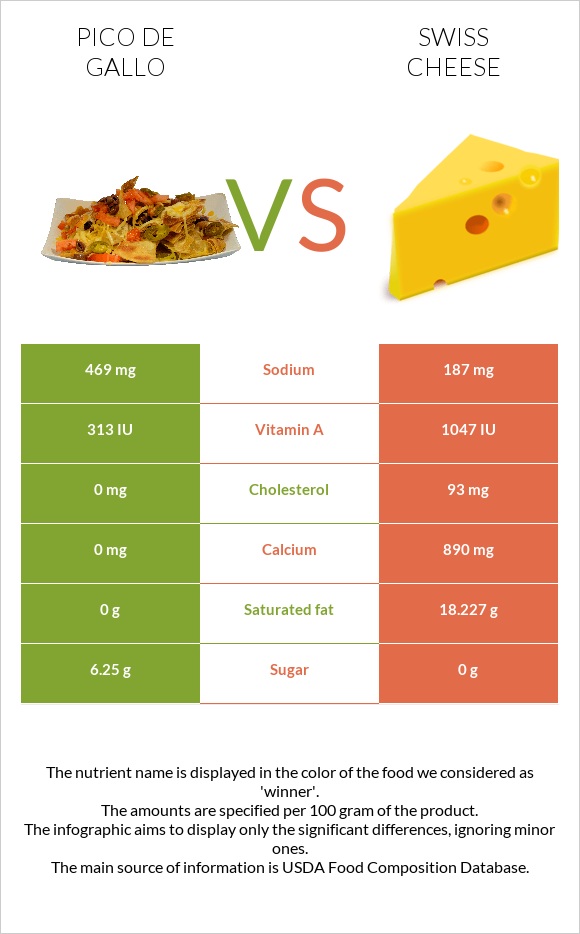Pico de gallo vs. Swiss cheese — In-Depth Nutrition Comparison
Compare
What are the differences between pico de gallo and Swiss cheese?
- Swiss cheese is richer than pico de gallo in calcium and vitamin A.
- Swiss cheese's daily need coverage for saturated fat is 91% more.
We used PACE, Pico De Gallo and Cheese, swiss types in this article.
Infographic

Infographic link
Mineral Comparison
Mineral comparison score is based on the number of minerals by which one or the other food is richer. The "coverage" charts below show how much of the daily needs can be covered by 300 grams of the food.
| Contains more CalciumCalcium | +∞% |
| Contains more IronIron | +∞% |
| Contains less SodiumSodium | -60.1% |
Vitamin Comparison
Vitamin comparison score is based on the number of vitamins by which one or the other food is richer. The "coverage" charts below show how much of the daily needs can be covered by 300 grams of the food.
| Contains more Vitamin CVitamin C | +∞% |
All nutrients comparison - raw data values
| Nutrient |  |
 |
DV% diff. |
| Vitamin B12 | 3.06µg | 128% | |
| Calcium | 0mg | 890mg | 89% |
| Saturated fat | 0g | 18.227g | 83% |
| Phosphorus | 574mg | 82% | |
| Selenium | 30µg | 55% | |
| Protein | 0g | 26.96g | 54% |
| Fats | 0g | 30.99g | 48% |
| Zinc | 4.37mg | 40% | |
| Vitamin A | 288µg | 32% | |
| Cholesterol | 0mg | 93mg | 31% |
| Vitamin B2 | 0.302mg | 23% | |
| Monounsaturated fat | 8.046g | 20% | |
| Calories | 31kcal | 393kcal | 18% |
| Sodium | 469mg | 187mg | 12% |
| Polyunsaturated fat | 1.341g | 9% | |
| Magnesium | 33mg | 8% | |
| Vitamin B5 | 0.353mg | 7% | |
| Copper | 0.047mg | 5% | |
| Vitamin B6 | 0.071mg | 5% | |
| Vitamin C | 3.8mg | 0mg | 4% |
| Vitamin E | 0.6mg | 4% | |
| Carbs | 9.38g | 1.44g | 3% |
| Folate | 10µg | 3% | |
| Choline | 15.5mg | 3% | |
| Potassium | 72mg | 2% | |
| Iron | 0mg | 0.13mg | 2% |
| Manganese | 0.026mg | 1% | |
| Vitamin B1 | 0.011mg | 1% | |
| Vitamin K | 1.4µg | 1% | |
| Net carbs | 9.38g | 1.44g | N/A |
| Sugar | 6.25g | 0g | N/A |
| Vitamin B3 | 0.064mg | 0% | |
| Trans fat | 0.987g | N/A | |
| Tryptophan | 0.401mg | 0% | |
| Threonine | 1.038mg | 0% | |
| Isoleucine | 1.537mg | 0% | |
| Leucine | 2.959mg | 0% | |
| Lysine | 2.585mg | 0% | |
| Methionine | 0.784mg | 0% | |
| Phenylalanine | 1.662mg | 0% | |
| Valine | 2.139mg | 0% | |
| Histidine | 1.065mg | 0% | |
| Omega-3 - ALA | 0.125g | N/A | |
| Omega-3 - DPA | 0.018g | N/A | |
| Omega-3 - Eicosatrienoic acid | 0.003g | N/A | |
| Omega-6 - Gamma-linoleic acid | 0.002g | N/A | |
| Omega-6 - Dihomo-gamma-linoleic acid | 0.032g | N/A | |
| Omega-6 - Eicosadienoic acid | 0.007g | N/A | |
| Omega-6 - Linoleic acid | 0.734g | N/A |
Macronutrient Comparison
Macronutrient breakdown side-by-side comparison
Protein:
0 g
Fats:
0 g
Carbs:
9.38 g
Water:
88 g
Other:
2.62 g
Protein:
26.96 g
Fats:
30.99 g
Carbs:
1.44 g
Water:
37.63 g
Other:
2.98 g
| Contains more CarbsCarbs | +551.4% |
| Contains more WaterWater | +133.9% |
| Contains more ProteinProtein | +∞% |
| Contains more FatsFats | +∞% |
| Contains more OtherOther | +13.7% |





